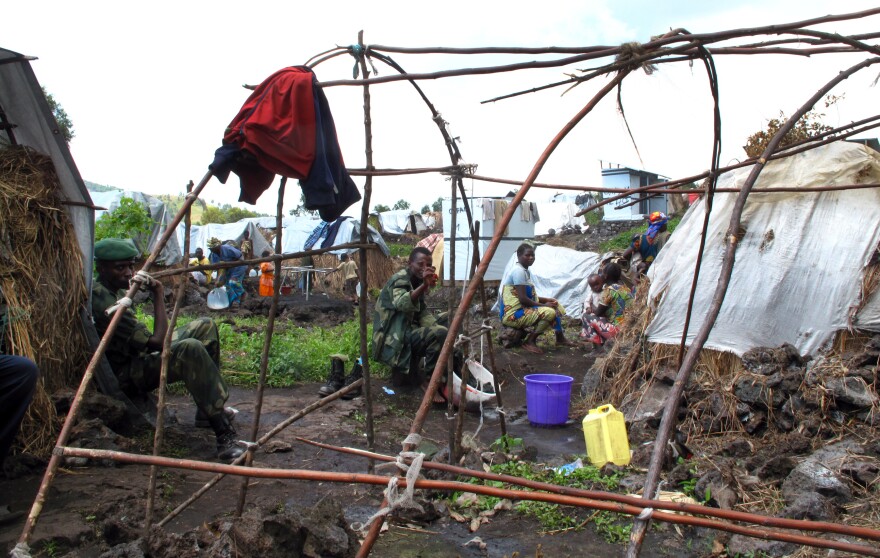Goma, a city on the eastern border of the Congo, has been a magnet for war refugees for nearly two decades. And in an expanding camp for displaced people, called Mugunga I, school principal Emmanuel Kibanja Miteso holds up a three-ring binder that reflects the history of war here.
The pages are a logbook for parent-teacher conferences. Every time fighting flares in the region, people flood into the displacement camps and the roster of names swells in the principal's binder.
Goma has seen its share of battles during the repeated convulsions in eastern Congo, but for the past decade or so it has often been seen as a relatively safe shelter from fighting.
But now Goma itself is a prize in the latest round of war.
The M23 rebels, a group made up of army defectors, launched an uprising last spring and have been advancing in eastern Congo against the weak Congolese army.

On Nov. 20, the M23 rebels came marching down from villages to the north and took over Goma. Ten days later, the rebels appeared to retreat under international pressure on the rebels and on neighboring Rwanda, which is widely believed to be the movement's biggest supporter.
Rebels In Hiding
But it seems M23 never really left Goma. The rebel fighters just changed into civilian clothes, went into hiding and remained in the town.
Many residents say the rebels are right here in the city. Fidel Bafilemba, a field researcher with the Enough Project, a Washington, D.C.-based advocacy group working to end crimes against humanity, has been tracking the movements of M23 through conversations with residents of Goma.
"We have even spoken to people who have been providing them food and water, things like that," he said. "The M23 is in town."
From the sunny balcony of his office, Bafilemba pointed out many neighboring houses where residents have fled, fearing another outbreak in fighting.
Meanwhile, the Congolese army is also back in Goma. This is the same army that last month tucked tail and ran when M23 moved in.
Now the army has taken up position on a hill just outside the Mugunga camp, with its thousands of tents of sticks and plastic sheeting. Some of the displaced people in this camp are here because they fled M23; others fled the Congolese army. They all came seeking safe ground. Now they find themselves between the positions of the two forces.
An elected leader in the camp, who asked not to be named because he's afraid of army commanders, said the camp is "right at the combat zone, with M23 on one side, the Congolese army on the other."
And, he added, Lake Kivu blocks the army's route of retreat from Goma.

Army Doesn't Inspire Confidence
Congo's army is not a comforting presence for the residents of the town.
Rape has been a recurring nightmare in the fighting, and Kahindo Immaculee, who is a sexual violence counselor in this camp, says the soldiers on the hill come into the camp at night.
On Dec. 17, she says, some women collecting firewood were ambushed by soldiers who selected the seven most attractive and sent the others home. The captive women were taken to the base and raped for three days.
Immaculee tried to get the women to stay for counseling, but they all collected their children and fled the camp. "We can't bear the life here," they told her.
United Nations forces still patrol this camp, but are seen as ineffective. They did not defend the city when the rebels arrived last month.
So all eyes are on M23 and the army. For almost two weeks now, no shots have been fired, but virtually no one expects it to stay this way.
Soldiers, Rebels Taking Supplies
Tariq Riebl, the humanitarian coordinator for Oxfam in Congo, says soldiers and rebels are stealing their water and other donated supplies.
"At what point does it become unsustainable?" he said. "You have so many armed groups from so many different factions. Is this just to push the political hand, the negotiations?"
Negotiations between M23 and the Congolese government in Uganda are supposed to come up with a power-sharing deal. But M23 insists on administrative control of Goma. The Congolese government refuses. And back at the camp, many people are looking to the United States.
Emmanuel Kibanja Miteso, the school principal, looks for signs of hope wherever he can find them. He says he heard last week that President Obama telephoned Rwandan President Paul Kagame and asked him to stop supporting M23. "I was really happy because M23 by themselves, they have no power to do anything."
Despite the violent history here, he's optimistic, he says, that it's only a matter of time before peace returns.
Copyright 2020 NPR. To see more, visit https://www.npr.org.



